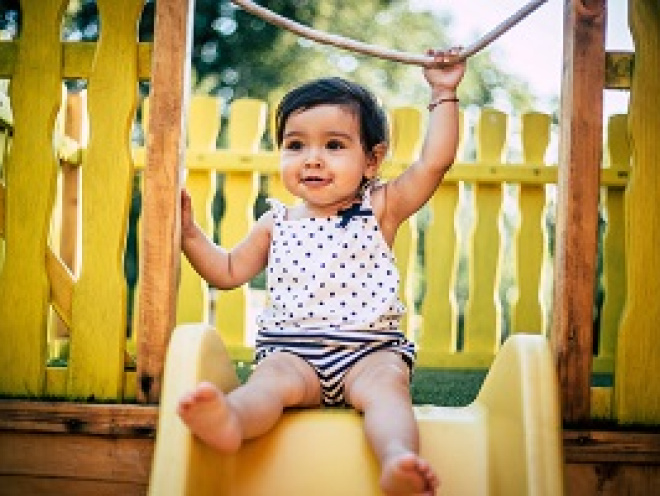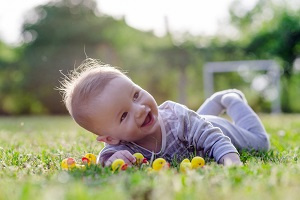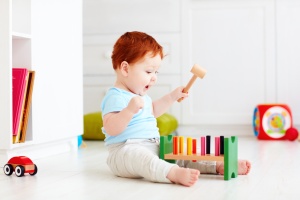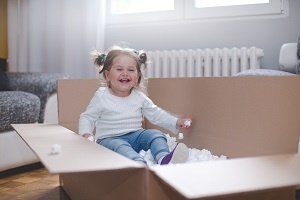What are the best ways to combine fun and learning as your infant begins to walk, talk and become more independent? Here we discuss some of the games and play that can encourage your child’s development.
Where the heck did that first year go? Life can be a blur of cooking, cleaning, shopping and soothing. But it’s only going to go quicker, so make sure you try and make time for a bit of fun.
Anything can be turned into a game. If someone tuts at you for turning the tinned food aisle into a drum kit, tell them it’s in the name of your child’s development. Just make sure you’ve got your child with you.
Let’s walk and talk
From 12 to 18 months lots of babies begin their march to independence. Many take their first steps and say their first words. There’s more imitation, motor skills are constantly improving and they can begin to understand routine commands.
Let’s pretend
Between the age of one and two, children are likely to start to pretend play (Dosman et al, 2012). This is usually directed at themselves (e.g. talking on the phone), then they bring in other characters (e.g. a teddy). Get yourself ready for the first of many, many tea parties.
“I love pretending the Queen’s on the phone for Yakob. He looks very serious as he babbles into the receiver. It makes me laugh way more than him.” Paulo, dad to Yakob, 16 months
Get creative
Mouthing is still important but your little one is getting more discerning with what goes in the mouth. So now’s a good time to unleash their inner Picasso. Modelling clay, paints or pens and paper can provide hours of fun. And lots of mess.
Always make sure you are close by and stay involved. Not only is it more fun for two but you might not want a glass of poster paint water all over the place.
Dancing
It’s time to groove. You’ve probably noticed your little one starting to copy things you do. So dig out your old dancing gear and throw some shapes.
Music classes are a brilliant way for toddlers to express themselves, practise rhythm and burn off energy. And if you fancy getting all nostalgic, baby raves and concerts can be a great way to experience music together.
Bubbles
Cheap and endlessly entertaining, bubbles have a mesmerising effect on lots of kids. It’s a great way for them to concentrate on movement and practise their grabbing, although you might have to explain where the bubbles keep disappearing to.
“Nothing makes Rebecca focus like me blowing bubbles. She can be tearing around the kitchen but as soon as I blow a few bubbles it’s like she’s been hypnotised. It’s very good for calming her down before her tea.” Rachel, mum to Rebecca, 15 months
It’s not rude to point
Reading is as important to your one year old as it is at any age. But now you can get more interactive.
Each page of a picture book is full of things to test your child’s knowledge with. Just point to the dog, the cat, the tree, the house, the car, whatever, and tell them what it is. Then see if they can repeat it.
You can also point and say ‘What’s this?’ to see whether they can get it on their own. It’s a great way for them to practise words and identify their growing world. All without simultaneously living on a farm, in a jungle and at a zoo.
Use your local park
Your baby has just spent the last year getting ready to walk. So get them out there and let them go. The UK has around 27,000 public parks and you can find your nearest park on the gov.uk website (House of Commons, 2017).
Many parks have a dedicated children’s playground full of equipment to swing, slide, spin and climb on. Plus, it’s all been designed to be safe and aid development. Parks are also a great way to introduce your child to nature, and go dog-, bird- and squirrel-spotting. They might make some new friends there too.
Fun times ahead
Whether you’re painting on a rainy day or swinging in the sun, your toddler will look to you for experiences. It’s easy to make the most mundane things fun. Playing together is good for all involved, so roll up your sleeves and get childish.
This page was last reviewed in April 2019.
Further information
Our support line offers practical and emotional support with feeding your baby and general enquiries for parents, members and volunteers: 0300 330 0700.
You might find attending one of our NCT New Baby groups helpful as they give you the opportunity to explore different approaches to important parenting issues with a qualified group leader and other new parents in your area.
Make friends with other parents-to-be and new parents in your local area for support and friendship by seeing what NCT activities are happening nearby.
Child development charity Zero to Three has lots of great ideas for keeping the kids amused and developing their brains and bodies.
Dosman CF, Andrews D, Goulden KJ (2012) Evidence-based milestone ages as a framework for developmental surveillance. Paediatrics & child health. 17(10):561-568 [Accessed 1st April 2019]
House of Commons. (2017) Public parks. Available from: https://publications.parliament.uk/pa/cm201617/cmselect/cmcomloc/45/45.pdf [Accessed 1st April 2019]








